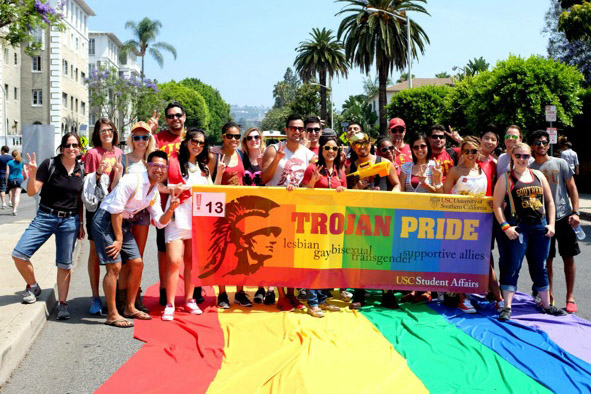Group helps reshape USC’s approach to LGBT athletes

Photo courtesy of the USC LGBT Resource Center
Trojan pride · USC students show their support for LGBT rights at the 2014 Los Angeles Pride Parade. Groups like the LGBT Resource Center, which organized the march, also help make athletics more inclusive.
Trojan athletes will wear shirts emblazoned with the logo “We Are SC” in rainbow font on Tuesday in honor of National Coming Out Day. On Monday afternoon, the shirts were heaped on the couch in the office of Donna Heinel, the senior associate athletic director at USC.
It’s a subtle show of support, Heinel said. But it’s something that Trojan athletes wanted — a way to create a positive impact for the LGBT population on campus. And the shirts are part of a wider campaign that Heinel and the USC LGBT Athletic Committee hope to expand throughout the year.
“We were thinking about a lot of ways to celebrate,” Heinel said. “The [athletes] said they wanted something that subtly shows support for gay student athletes and something that allies can wear proudly. It’s going to get people talking, and that’s really what we want to do.”
The LGBT Athletic Committee has existed for years, but in the last year it has been revitalized under a new group of leaders. This group includes Heinel, athletic personal development coordinator Whitney Rotrock, sports psychologist Nohelani Lawrence and associate women’s soccer coach Jen Klein.
Together, this group is hoping to reshape the way in which USC Athletics approaches topics such as LGBT issues, inclusivity and social justice. Due to the significance of athletics on campus, the committee hopes to begin setting an example of acceptance for the entire Trojan community.
“It has a large trickle down effect,” said Kelby Harrison, director of the LGBT Resource Center. “The climate and culture of our athletics department affects every student at USC and even our national reputation.”
Traditionally, the world of sports has gained a stereotype of being unaccepting of openly LGBT athletes, particularly in hyper-masculine arenas such as football or men’s basketball. With little visibility, many athletes felt uncomfortable expressing themselves fully in teams throughout their careers.
The committee hopes to change this by creating a positive culture and environment for LGBT athletes and their teammates throughout the University. Klein feels that today’s collegiate athletes are already far ahead of previous generations of athletes in their comfort and acceptance of the LGBT community. The LGBT Athletic Committee’s role is to supplement the athlete experience, providing programming and support when necessary.
“So many of these athletes are already so comfortable with who they are,” Klein said. “It’s really incredible to see how much better these issues have gotten, even in just the last few years. It’s our job to just keep that going, to keep asking them what they need and what’s most important to them.”
This goes far beyond just LGBT issues. Heinel and Klein recognize that social issues play an integral role in the lives of students, and those issues can’t always be separated from their roles as athletes. The committee hopes to create a space where these discussions — no matter how hard or uncomfortable — can take place for athletes on campus.
Earlier this season, six players from the women’s soccer team decided to kneel during the national anthem before a Pac-12 game to raise awareness for victims of police brutality. This type of decision is not simple or easy, according to Heinel. The players spoke to the administration, their coaching staff and their team before ultimately deciding to continue with the peaceful protest.
Heinel and the committee hope to continue these types of conversations. Ultimately, their goal parallels the overall goal of the USC administration — to create an open, accepting environment for all students. By doing so, the committee believes that the USC sports programs will only continue to excel.
“It’s better for athletics teams because when you’re accepting, you’re bringing in the best athletes,” Harrison said. “That means LGBT, that means racial and ethnic identities. It’s how you succeed because you’re drawing from the widest pool.”
Only half an hour after Heinel sent out an email letting all the teams know that the LGBT shirts were waiting in her office, three athletes were already waiting in the lobby to pick up shirts for themselves, their teammates and coaches.
Heinel grinned as she exited her office and greeted each athlete. She knows that the group donning the shirts on Tuesday might be small, but she believes the impact that each shirt makes is significant for the culture of USC Athletics as a whole. It sends a message of acceptance that, for Heinel, is the most important part of any sports program.
